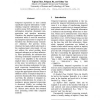Free Online Productivity Tools
i2Speak
i2Symbol
i2OCR
iTex2Img
iWeb2Print
iWeb2Shot
i2Type
iPdf2Split
iPdf2Merge
i2Bopomofo
i2Arabic
i2Style
i2Image
i2PDF
iLatex2Rtf
Sci2ools
116
click to vote
COLING
2010
2010
Automatic Temporal Expression Normalization with Reference Time Dynamic-Choosing
Temporal expressions in texts contain significant temporal information. Understanding temporal information is very useful in many NLP applications, such as information extraction, documents summarization and question answering. Therefore, the temporal expression normalization which is used for transforming temporal expressions to temporal information has absorbed many researchers' attentions. But previous works, whatever the hand-crafted rules-based or the machine-learnt rules-based, all can not address the actual problem about temporal reference in real texts effectively. More specifically, the reference time choosing mechanism employed by these works is not adaptable to the universal implicit times in normalization. Aiming at this issue, we introduce a new reference time choosing mechanism for temporal expression normalization, called reference time dynamic-choosing, which assigns the appropriate reference times to different classes of implicit temporal expressions dynamically ...
COLING 2010 | Computational Linguistics | Temporal Expression Normalization | Temporal Expressions | Temporal Information |
Related Content
| Added | 13 May 2011 |
| Updated | 13 May 2011 |
| Type | Journal |
| Year | 2010 |
| Where | COLING |
| Authors | Xujian Zhao, Peiquan Jin, Lihua Yue |
Comments (0)

